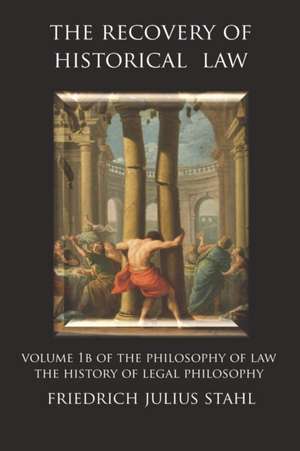The Recovery of Historical Law: The Philosophy of Law, cartea 1B
Autor Friedrich Julius Stahlen Limba Engleză Paperback – 19 feb 2021
In The Rise and Fall of Natural Law, this descent into the maelstrom was chronicled from its origin to its inevitable conclusion - at least, in the world of intellect. Culture lags intellect, but it is never insulated from it. Ideas do have consequences. The intellectual counterpart to our cultural crisis already played itself out 200 years ago. And the crisis of the European mind, by which intellectual culture shifted from Revelation to Reason, found its fitting conclusion in the work of the ultimate solipsist, Johann Gottlieb Fichte. Fichte's focus on enthusiastic conviction and the primacy of the subjective makes him the prophet of the modern world. Indeed, his orientation has now triumphed for all to see. His story, and the stories of those leading up to him - the leading characters in "the Rise and Fall of Natural Law" - are crucial to understanding the genesis of the modern world.
But that is not the end of the story, for history goes on. That spot, precisely where the first half of Stahl's history of legal philosophy leaves off, is where the second half picks up. The Recovery of Historical Law narrates the attempts to overcome this radical subjectivism and establish a functioning social order in which the ideal matches up with the real, the theory is in harmony with the practice.
After discussing the work of Locke, Montesquieu, Constant, and the Doctrinaires, all of whom functioned fully within the framework of autonomous natural law while attempting to mitigate it, Stahl reveals the hero of the story: Friedrich Schelling. It was Schelling who initiated the gargantuan task of reorienting philosophy away from subjectivism and back toward objective reality. Stahl characterizes this as a "Samsonesque act" whereby Schelling "lifted the temple of the previous philosophy off of its pillars and buried the whole army of enemies, himself included, under its ruins."
For one thing, this explains the cover illustration, "Samson Destroying the Philistine Temple." For another, it intimates how Schelling, like Moses, stood at the entry to the Promised Land without entering in. Schelling's philosophy is an exercise in pantheism, an orientation from which he struggled to free himself later in life. And in fact, Hegel, his great fellow laborer in so-called "speculative philosophy," took that pantheism and turned it into a mighty system in its own right. A rabbit trail that carried many into another dead end, one with which we wrestle today: "conscious" or "woke" big government.
But that is not the end of the story. Schelling's first fruits were recovered by the Historical School of Jurisprudence, led by Friedrich Carl von Savigny. Here the work of Counter-Revolutionaries such as Joseph de Maistre and Edmund Burke was carried forward to bear fruit for jurisprudence. And this is the foundation for Stahl's own system, as contained in Volume II: The Doctrine of Law and State on the Basis of the Christian World-View. It is on this basis that the laborious task to reconstruct Western civilization can begin. And not a moment too soon.
Preț: 119.08 lei
Nou
Puncte Express: 179
Preț estimativ în valută:
22.79€ • 23.54$ • 18.97£
22.79€ • 23.54$ • 18.97£
Carte tipărită la comandă
Livrare economică 25 martie-08 aprilie
Preluare comenzi: 021 569.72.76
Specificații
ISBN-13: 9789076660608
ISBN-10: 9076660603
Pagini: 224
Dimensiuni: 152 x 229 x 12 mm
Greutate: 0.3 kg
Editura: WordBridge Publishing
Colecția The Philosophy of Law
Seria The Philosophy of Law
ISBN-10: 9076660603
Pagini: 224
Dimensiuni: 152 x 229 x 12 mm
Greutate: 0.3 kg
Editura: WordBridge Publishing
Colecția The Philosophy of Law
Seria The Philosophy of Law
